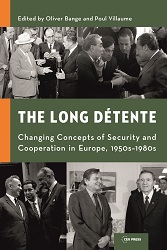Between Power Politics and Morality
The United States, the Long Détente, and the Transformation of Europe, 1969–1985
The United States, the Long Détente, and the Transformation of Europe, 1969–1985
Author(s): Stephan Kieninger
Subject(s): Diplomatic history, Political history, Post-War period (1950 - 1989)
Published by: Central European University Press
Keywords: Cold war;US;Ostpolitik;US Transformation Policy
Summary/Abstract: Détente seemed to prolong the division of Europe. It seemed to be un-American. From the perspective of its many critics, détente allowed for the Soviet Union’s strategic buildup in the 1970s and it precipitated America’s decline in the wake of Vietnam. Even worse, by preaching moral equivalence between Communism and Western democracy, détente allegedly made the United States lose sight of its mission. Only when Ronald Reagan started to abandon détente could the U.S. win the “Cold War endgame.” This is the traditional narrative. This chapter tells a different story by arguing that the U.S. policy of peaceful change could only thrive in a sustainable security framework that the United States and its Western European allies built through détente,dialogue, and engagement with the Soviet Union.
Book: The Long Détente. Changing Concepts of Security and Cooperation in Europe, 1950s–1980s
- Page Range: 281-313
- Page Count: 33
- Publication Year: 2017
- Language: English
- Content File-PDF

